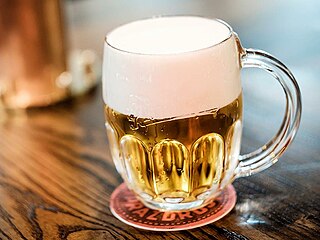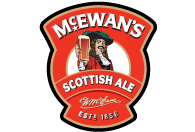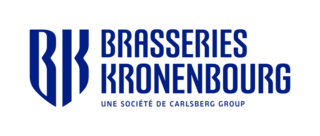Related Research Articles

Foster's Lager is an internationally distributed brand of Australian lager. It is owned by the Japanese brewing group Asahi Group Holdings, and is brewed under licence in a number of countries, including its biggest market, the UK, where the European rights to the brand are owned by Heineken International.

Pilsner is a type of pale lager. It takes its name from the Bohemian city of Plzeň, where the world's first pale lager was produced in 1842 by Pilsner Urquell Brewery.

John Smith's Brewery in Tadcaster, North Yorkshire, England, produces beers including John Smith's, the highest selling bitter in the United Kingdom since the mid-1990s.

Pale lager is a pale-to-golden lager beer with a well-attenuated body and a varying degree of noble hop bitterness.

Żywiec Brewery is one of the largest breweries and beer producers in Poland. Founded in 1856 in the town of Żywiec, the brewery manufactures pale lager with a 5.5% alcohol volume. Grupa Żywiec S.A. consists of five main breweries: Żywiec Brewery, Elbrewery, Leżajsk, Warka Brewery and Browar Namysłów. Currently, the Dutch Heineken Group, with a 99% shareholding, has control over its major operations. The brewery has the capacity of producing 5 million hls a year, making it the largest brewery in Grupa Żywiec.
Scottish & Newcastle plc was a brewing company headquartered in Edinburgh, Scotland, which expanded from its home base to become an international business with beer volumes growing almost tenfold.

Koninklijke Grolsch N.V., known simply as Grolsch, is a Dutch brewery founded in 1615 by Willem Neerfeldt in Groenlo. In 1895, the de Groen family bought the brewery. They had started their own brewery in Enschede in the early 19th century. It held a significant stake until November 2007. Today the main brewery is located in Enschede.

McEwan's is a brand of beer owned by Carlsberg Marston's Brewing Company. It was originally brewed by William McEwan's Fountain Brewery in Edinburgh, Scotland. The McEwan's brand passed to Heineken in 2008 after their purchase of Scottish & Newcastle's British operations. Heineken sold the brand to Wells & Young's in 2011, who sold their brewing operation, including the McEwan brand to Marston's in 2017. Cans and bottles are now brewed in Bedford, England.

Kronenbourg Brewery is a brewery founded in 1664 by Geronimus Hatt in the Free Imperial City of Straßburg, Holy Roman Empire. The name comes from the area where the brewery relocated in 1850. The company is owned by the Danish multinational Carlsberg. The premium brand is Kronenbourg 1664, a 4.6% abv pale lager.
Beer in Africa, especially lager, is produced commercially in most African countries, and indigenous people also make varieties of beer. Beer is served in various locales, from neighbourhood shebeens to upscale bars. Many countries have standardized beer bottle sizes, which are cleaned and re-used, so when buying beer at a store, people often must pay a deposit on the bottle and the price of the beer. An alternative to glass-bottle beers is local beer sold in tetra-pak style paper cartons.

Brewing in Ireland has a long history. Production currently stands at over 8 million hectolitres, and approximately half the alcohol consumed is beer.

Beer is the most popular alcoholic drink in New Zealand, accounting for 63% of available alcohol for sale. At around 64.7 litres per person per annum, New Zealand is ranked 27th in global beer consumption per capita. The vast majority of beer produced in New Zealand is a type of lager, either pale or amber in colour, and typically 4–5% alcohol by volume.

Beer in the Netherlands mostly comprises pale lagers like Heineken and Grolsch. Heineken is the world's second-largest brewer.

Sociedade Central de Cervejas is a Portuguese brewery, founded in 1934. Its main output is the Sagres brand of beers. The company has been controlled by Heineken since April 2008.

Birra Moretti is an Italian brewing company, founded in Udine in 1859 by Luigi Moretti. In 1996, the company was acquired by Heineken N.V. The brewing plant in Udine was sold to the newly formed Birra Castello S.p.A., and the beer is now also brewed in different locations including in Manchester, United Kingdom. Birra Moretti became the highest-selling draught lager in the United Kingdom in 2024.

Gambrinus is a beer brewed in the Czech Republic at the Pilsner Urquell Brewery. It is one of the most popular beers in the Czech Republic. The beer is named after Gambrinus, a legendary European king known for his mythical brewing abilities. The company was founded in 1869.
Heineken N.V. is a Dutch brewer which owns a worldwide portfolio of over 170 beer brands, mainly pale lager, though some other beer styles are produced. The two largest brands are Heineken and Tecate; though the portfolio includes Amstel, Fosters, Sagres, Cruzcampo, Skopsko, Affligem, Żywiec, Starobrno, Zagorka, Zlatý Bažant, Laško and Birra Moretti.

Bintang Beer is a brand of beer from Indonesia and is produced by PT Multi Bintang Indonesia Tbk, a subsidiary of Heineken Asia Pacific part of Heineken.
This article discusses beer in Central America.

Fucking Hell is a German pale lager, a Pilsner, with an alcohol content of 4.9%. It is named after Fucking, the previous name of the village of Fugging in Austria; hell is the German word for 'pale' and a typical description of this kind of beer. The beer's name was initially controversial. Both the local authorities in Fucking and the European Union's Trade Marks and Designs Registration Office initially objected to the name. It was eventually accepted and the lager is sold internationally.
References
- ↑ "Brewing big guns are refused another drink". www.scotsman.com. Retrieved 2017-09-14.
- ↑ "Further fears after brewery cuts". 2004-02-18. Retrieved 2017-09-14.
- ↑ "Follow the bear... out the door as Hofmeister is axed" . Retrieved 2017-09-14.
- ↑ Davies, Rob (2016-11-21). "George the bear seeks new followers as Hofmeister lager returns". The Guardian. ISSN 0261-3077 . Retrieved 2017-09-14.
- ↑ "Follow the bear again! Hofmeister to make a comeback 13 years after it was axed". Express.co.uk. 2016-10-10. Retrieved 2017-09-14.
- ↑ "Follow the bear: Hofmeister brings George out of hibernation". The Week Portfolio. Retrieved 2017-09-14.
- ↑ Davies, Rob (2017-10-18). "Hofmeister redux as real Bavarian craft lager wins global beer award". The Guardian. ISSN 0261-3077 . Retrieved 2017-10-20.
- ↑ "This is officially the best beer in the world". The Independent. 2017-10-18. Retrieved 2017-10-20.
- ↑ "Start - Privatbrauerei Schweiger". Privatbrauerei Schweiger (in German). Retrieved 2017-09-14.
- ↑ "The death of cheap lager". 2003-10-16. Retrieved 2017-09-14.